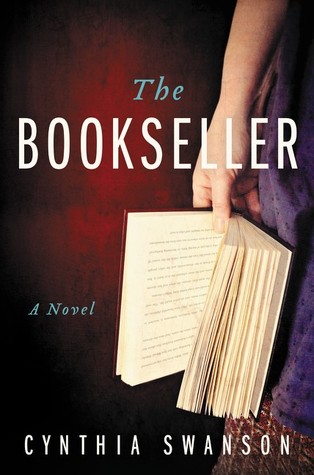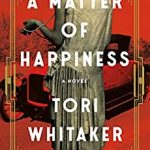 Format read: ebook provided by the publisher via Edelweiss
Format read: ebook provided by the publisher via EdelweissFormats available: hardcover, paperback, ebook, audiobook
Genre: literary fiction
Length: 338 pages
Publisher: Harper
Date Released: March 3, 2015
Purchasing Info: Author’s Website, Publisher’s Website, Goodreads, Amazon, Barnes & Noble, Kobo, Book Depository
Nothing is as permanent as it appears . . .
Denver, 1962: Kitty Miller has come to terms with her unconventional single life. She loves the bookshop she runs with her best friend, Frieda, and enjoys complete control over her day-to-day existence. She can come and go as she pleases, answering to no one. There was a man once, a doctor named Kevin, but it didn’t quite work out the way Kitty had hoped.
Then the dreams begin.
Denver, 1963: Katharyn Andersson is married to Lars, the love of her life. They have beautiful children, an elegant home, and good friends. It’s everything Kitty Miller once believed she wanted—but it only exists when she sleeps.
Convinced that these dreams are simply due to her overactive imagination, Kitty enjoys her nighttime forays into this alternate world. But with each visit, the more irresistibly real Katharyn’s life becomes. Can she choose which life she wants? If so, what is the cost of staying Kitty, or becoming Katharyn?
As the lines between her worlds begin to blur, Kitty must figure out what is real and what is imagined. And how do we know where that boundary lies in our own lives?
My Review:
I’ll say this up front. This story really got me in the feels.
The story starts out simply enough, and then switches into something awesome.
We meet our heroine in the Autumn of 1962 in Denver. She owns a not-too-successful bookstore and has a generally happy life. She and her best friend Frieda own “Sisters Bookshop” and have been besties since high school. Kitty Miller is single and is in control of everything in her life. Everyone she is close to is generally pretty happy, and things always seem to work out for the best.
But she and Frieda are facing an economic crisis. The streetcar line that used to bring lots of business into their little shop is long gone, and the bus that replaced it doesn’t stop on their street. They are having difficulties making the rent, and they need to either close or move out to one of the new suburban shopping malls, because that’s where all the customers have gone.
When Kitty sleeps, she dreams another life. It is Denver in the Spring of 1963. She is Katharyn Andersson, and she is married. She met Lars Andersson in the mid-1950s, when she placed a personal ad in the Denver Post. It was during the otherwise brief time in her life when she wanted to be called by her full name, Katharyn, instead of the more familiar Kitty.
Kitty and Katharyn are the same woman, but their joined life split when Kitty placed that personal ad. In her real life at the bookstore, she called one of her respondents and they had a lovely long chat on the telephone. The talk was so lovely that they agreed to meet, but he never showed up. Lars Andersson died of a heart attack right after the call, because he was alone and there was no one to call an ambulance.
In the dream life, that lovely phone call lasted just long enough for Kitty to still be on the line when Lars’ heart tried to kill him. Kitty ran next door and called the ambulance that saved Lars’ life. The rest is another history. A happy and successful marriage, children, a home in the suburbs, and no bookstore.
At first, it seems as if the story is slightly science-fictional. A tale of parallel universes, or a weird version of It’s a Wonderful Life, where Kitty gets to see the consequences of her various choices.
That Kitty is reading Ray Bradbury’s Something Wicked This Way Comes (published in September 1962) makes the mind go down an SF path.
But the more that Kitty dreams herself as Katharyn, the more she falls in love, not just with Lars, but with the life that they have together. Until tragedy strikes, and she begins to wonder which life is her real one.
Once Katharyn discovers that her dream is not of a better future, but merely a different one, she decides to take charge of her own life, whichever it might be, so that she can finally come to grips with what is real. Especially because it is hard.
Escape Rating A: I loved this because it shook me up, made me think, and nearly made me cry. Also because I had to get almost halfway through the book before I figured out what had caused the break and which life was probably real. And why.
At the same time, I loved the way that the protagonist takes lessons from her dream life and uses them to make substantive changes in her real life – her dreams were an escape, but they also brought about significant healing.
This could have been science fiction and it still would have made a powerful story. Everyone has probably had moments in their life that turned out to be a crossroad, and we all wonder what would have happened if we had gone down the other path. In our darkest moments, we tell ourselves that the other choice would have put us into a better place than the one we are in. Sometimes we forget that if you change one thing, you change everything.
The protagonist finally figures out that she has to move forward, and that she can’t retreat from unhappiness and grief, no matter how much she tries. There is beauty in the future, even if there is also a serious lack of control over circumstances. The pleasure, in the end, is worth the pain.
Readers who do not remember the early 1960s will be surprised at how different life was for women. Not just the societal expectation, if not downright compulsion, towards marriage and motherhood, but also the subtle but completely accepted norms of economic repression and racism. Frieda and Kitty could not get a business loan without a co-signer, for example. Not because their business was new, but because they were women. Women did not have credit on their own without a man, either a husband or a father. The casual assumption that women with children didn’t work, and if they did they must be doing harm to their children was universal. And terribly hurtful.
The Bookseller is a compelling and appealing portrait of a woman faced with overwhelming challenges who uses a novel but fascinating way of giving herself time to move on. And it is also a marvelous peek back to a time that is behind us. Or is it?.
Reviewer’s Note: After finishing the book, I did the math and realized that I was the same age as Katharyn’s kids in 1963. I would have been a year behind them in school, because my birthday is later in the school year. But still, this is a time and a world that I have hazy memories of. And it felt right.










The blurb already attracted me : the dream, the reality, the parallel lives, which is real and which isn’t, escapism and – last but not least – a bookshop. That book speaks to me, thanks very much for reviewing it because I’d never heard of it 🙂
I agree. I got it for the bookshop, and stuck with it for the amazing story. It packs a big wallop in a not-too-long book. I loved it. (Well, duh)
Wow … just … WOW! This sounds like an incredible book! I love that it was so surprising and that it really drew you in. Thanks for being a part of the tour!